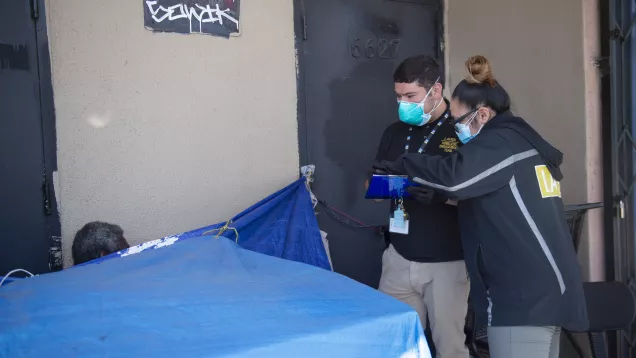
As one of the first orders of business following the LA City Council’s July recess, Councilmember Mark Ridley-Thomas - who chairs the City’s Homelessness and Poverty Committee - and co-presenters Councilmember Mike Bonin and Councilmember Curren Price - introduced a motion which recognizes that if street engagement services are to make a meaningful and measured impact in addressing the homeless crisis, then outreach teams must be equipped with a significant infusion of resources to help transition individuals into long-term supportive and affordable housing. With his motion, Councilmember Ridley-Thomas proposed establishing the “Housing Now Fund”, an initiative through which the City and County of Los Angeles will partner to provide rental subsidies and supportive services for a minimum of 10,000 people experiencing homelessness.
Earlier this week, the Los Angeles City Council received the first installment of a robust, Citywide Street Engagement Strategy - the first of its kind in Los Angeles. The Street Engagement Strategy would ensure standardized assessment of encampments, an adequate period of dedicated street engagement at all sites where unsheltered people reside, and a transparent and accountable process by which street engagement teams work collaboratively to help unsheltered individuals transition indoors to more appropriate and dignified housing options with services attached.
The Housing Now motion would complement the CAO's Citywide Street Engagement Strategy by providing the much-needed housing resources to ensure successful street engagement across the City.
“Successful street engagement depends on having a supply of affordable and supportive housing that is readily available to place unhoused clients without delay,” said Councilmember Ridley-Thomas. “We need to invest in these long-term solutions, and the investment will need to be substantial if we want to see a difference on our streets. We can do this through the ‘Housing Now Fund.’”
On March 3, 2021, the Los Angeles City Council unanimously instructed City staff to develop the framework to establish a Right to Housing in the City of Los Angeles (City). A Right to Housing is predicated on four pillars: homelessness prevention, adequate interim and permanent housing (with supportive services attached), and effective street engagement. These four pillars must work seamlessly to build a system that prevents and addresses the homeless crisis that profoundly impacts communities across the City. The “Housing Now Fund” would be a key component of establishing the Right to Housing framework.
Over 60% of the homeless crisis in the County is located in the City. While the City, in collaboration with the County, has continued to expand the homelessness safety net to create approximately 15,000 shelter beds and 24,600 permanent housing slots, the supply remains insufficient to address the crisis – as 28,000 Angelenos remain unhoused.
“It is critical that we build a balanced system so that individuals don’t get stuck in shelter beds without a viable exit strategy to transition into long-term housing. Without a long-term placement readily available, individuals will continue to occupy a shelter bed that could have assisted another individual from transitioning off the street,” said Councilmember Ridley-Thomas. “Ongoing subsidized rental assistance, especially for those on the street who are coping with serious health, mental health and substance use issues, is a necessary and cost-effective strategy to help end not just an episode of homelessness, but chronic homelessness for many living on the streets of Los Angeles.”
The motion to establish the “Housing Now Fund” directs the City’s Chief Administrative Officer and the Chief Legislative Analyst to work in partnership with the County of Los Angeles’ Chief Executive Officer and the Director of the Department of Health Services to identify funding to create a minimum of 10,0000 flexible rental housing subsidies that would be targeted to clients living in the City of Los Angeles who have significant health and mental health needs.
The State of California’s FY 2021-22 Budget includes $4.8 billion in new resources for programs including new capital to construct permanent housing, but to fully take advantage of these capital investment opportunities, localities will need to supply rental subsidies. The motion proposes a potential collaboration with the County, where the City provides the funding for the rental costs, and the County provides the supportive services to the housed clients.
“The only effective solution to the homelessness crisis is housing and services — and that demands that we focus our resources on programs that urgently move large numbers of people indoors, into stable, long-term housing,” said Councilmember Mike Bonin. “That’s why I have long championed LA County’s Housing for Health program, which quickly moves people into existing housing, without the time and cost of new construction. I am proud to partner with Councilmember Ridley-Thomas on this proposal, which will build on that model and help us provide a right to housing in Los Angeles.”
“No matter how the condition of homelessness has come to be in someone's life, falling on hard times, coping with trauma, mental illness or substance abuse, it is multi-facetted and should be treated as such,” said Councilman Curren Price. “A right to housing, case management, tied to intensive supportive services is a positive approach in the right direction to addressing this emergency. With rising rents, the high costs of living and the pandemic, this situation has created unimaginable hardships for our neighbors.”
“We must expand the resources needed to swiftly and sustainably house those living on the streets and provide them with the services they need to thrive. If the City and County both step up and do what we are best equipped to do, we can make a meaningful difference. There is no other way to work our way out of this crisis,” said Councilmember Ridley-Thomas.